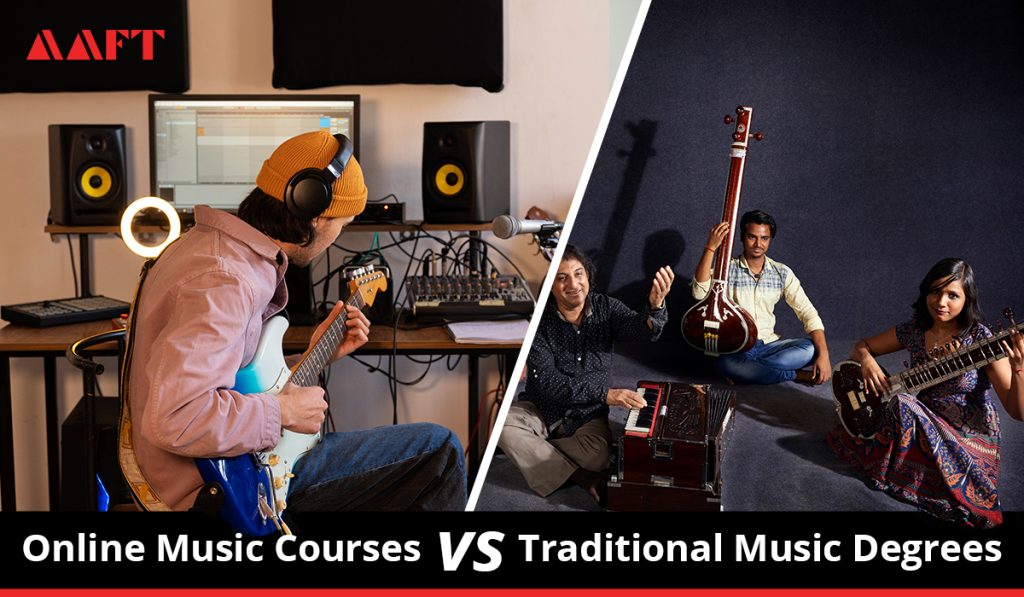Online Music Courses vs. Traditional Music Degrees
Aspiring musicians and music lovers now have more alternatives than before thanks to the substantial evolution of music education in recent years. Traditionally, the main option for individuals wishing to build a strong foundation in music has been to pursue traditional music degrees, which are typically offered at esteemed universities.
On the other hand, online music classes are becoming a popular and practical substitute, upending the traditional method. To assist you in selecting the course that best suits your musical goals, we’ll go over the main distinctions between traditional music degrees and online music courses in this blog.
What are online music courses?
The digital era gave rise to online music classes, which have become increasingly popular because they provide flexible and easily accessible chances for musical development.
What are Traditional Music Degrees?
Formal schooling and classical training are still strongly supported by traditional music degrees, which are rooted in centuries-old customs.
Read Also: Top 5 Ways to Write an Unforgettable Song
What are the benefits of a Traditional Music Degree?
1. Personal Instruction Experience
Conventional music degrees provide a full-time, in-person learning environment in a classroom setting. Students can engage in close interactions with peers and lecturers in this setting, which promotes a dynamic and collaborative learning environment.
2. Comprehensive Curriculum
The curricula for these schools are often well-established and encompass a wide range of musical subjects, such as composition, performance, history, and theory. Pupils can focus on a variety of instruments and musical styles to develop a thorough understanding of their chosen area.
3. Credibility and Status
Prestigious faculty and robust alumni networks are hallmarks of many traditional music institutions. In the music industry, graduating from such schools frequently carries a high degree of respect and distinction.
Read Also: 5 Essential Rap Techniques Every Aspiring Artist Should Master
4. Performance-Based Options
Conventional music programs frequently provide lots of chances for students to participate in ensembles, live concerts, and collaborations, giving them invaluable stage experience.
5. Exposure to Cutting-Edge Facilities and Equipment
Students who enroll in traditional music degree programs have access to cutting-edge facilities and equipment to greatly improve their educational experience. These spaces could have recording studios, performance halls with optimal acoustics, well-equipped practice rooms, and collections of specialty instruments.
6. Recognition of Degree by All Employers:
Employers in the music industry and other fields generally recognize and value the status and credibility of a degree that a conventional music institution offers.
What are the Benefits of Online Courses?
1. Easy Access:
Online music courses provide learners of every age and culture with an unmatched level of convenience. You can access your classes from home, while traveling, or at a nearby café when you take online courses. Learners in online music courses can frequently advance at their speed.
A lot of online music platforms provide resources and course materials to users around the clock. This makes it ideal for people who are busy because it allows you to study, practice, or review your lessons whenever it is convenient for you.
Read Also: A Guide for Students Considering a Career in Music
Flexibility:
An essential feature of online music classes is flexibility, which has multiple advantages for students. Students can balance their enthusiasm for music instruction with their existing commitments when they learn online. Students can design timetables for online courses that correspond with their hours of maximum productivity. Distance education eliminates geographical limitations.
Cost-Effectiveness:
Enrolling in an online music program is frequently less expensive than pursuing a traditional music degree. Due to their often cheaper tuition costs, online programs are more affordable for a larger number of students. Significant financial reductions are achieved by online students by eschewing the costs of on-campus housing, meals, and transportation. There’s no need to go to a specific place for your education because you can learn from anywhere, which further lowers costs.
Access to a Vast Faculty:
Students enrolled in online music classes have the opportunity to study with a broad range of professors, each of whom has a specialization and method of instruction. You can receive instruction from teachers who are dispersed over the globe, providing a global outlook and a variety of musical traditions. You can explore your hobbies by taking advantage of the specialized courses offered by professionals in particular musical niches on online platforms. You can explore your hobbies by taking advantage of the specialized courses offered by professionals in particular musical niches on online platforms. You can select instructors whose pedagogical approaches align with your learning objectives and style from a diverse pool of options.
Read Also: How to Choose the Right Music Course: Step-by-Step Guide
Conclusion
Both traditional music degrees and online music courses offer advantages and can lead to prosperous and satisfying careers in the music industry. In the end, the choice will depend on your own circumstances and ambitions. Your love of music and commitment to learning will be the main drivers of your musical journey, regardless of whether you decide to pursue a traditional music degree or take online courses. In the end, you are the one who shapes your own route to musical greatness.
FAQ:
Which type of music course is better?
There is no one-size-fits-all answer to this question. The best type of music course for you will depend on your individual needs and goals. Consider your budget, schedule, and learning style when making your decision.
What are the job prospects for graduates of online music courses and traditional music degree programs?
The job prospects for graduates of both online music courses and traditional music degree programs vary depending on the specific field of music they choose to pursue. However, in general, graduates of both types of programs can expect to find jobs in teaching, performance, composition, and music production.
Which type of music course is more rigorous?
Traditional music degree programs are generally more rigorous than online music courses. This is because traditional music degree programs typically require students to complete more coursework and participate in more extracurricular activities, such as ensembles and performances.
Read Also: The Impact of Technology on the Music Industry











